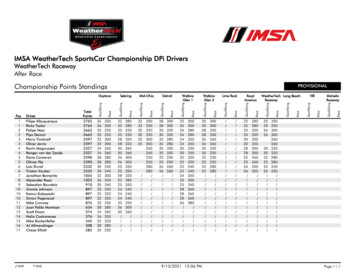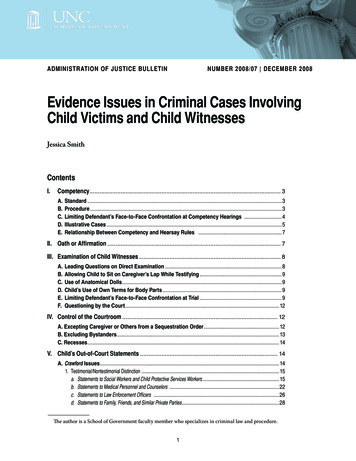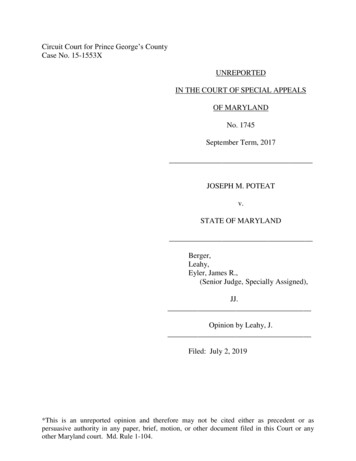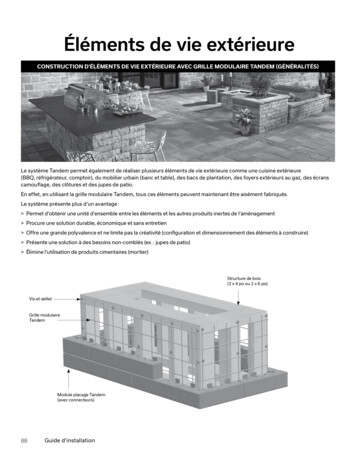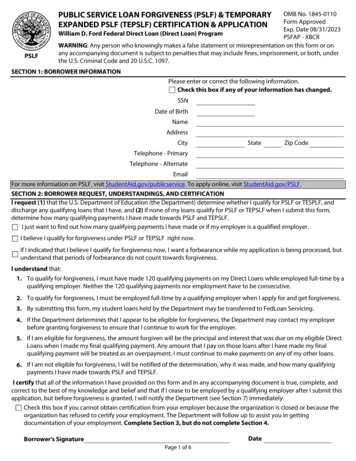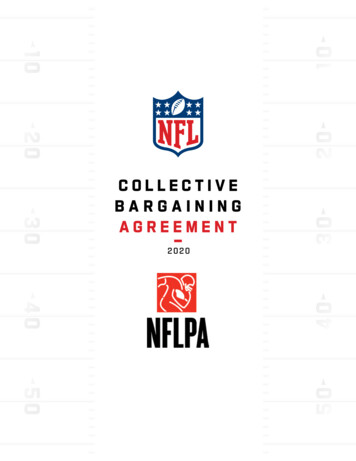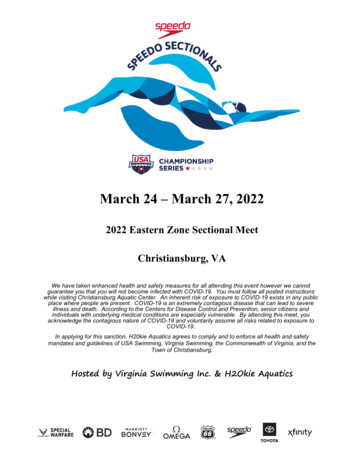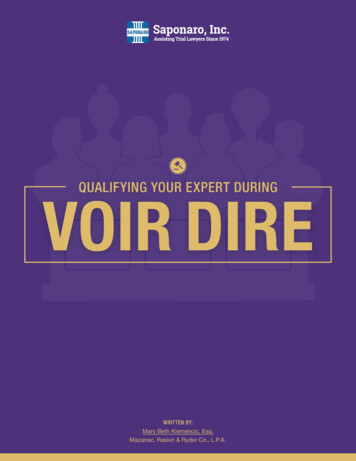
Transcription
QUALIFYING YOUR EXPERT DURINGVOIR DIREWRITTEN BY:Mary Beth Klemencic, Esq.Mazanec, Raskin & Ryder Co., L.P.A.
The qualification process by voirdire at trial is not the same as aDaubert hearing.A Daubert hearing will usually occur before trial, initiated by a motion in limine, when a partyseeks to preclude an expert witness from testifying, in total or in part, because the expert usedunreliable principles and methodology or does not hold the required level of expertise on thesubject matter.It is the Rules of Evidence that governs whether a witness is qualified as an expert and the Rulesalong with the guidance of Daubert v. Merrell Dow Pharmaceuticals Inc.,1 General Electric v.Joiner,2 and Kumho Tire Co., Ltd. v. Carmichaelthat3 governs whether an expert’s testimony isrelevant, reliable and admissible.1. 509 U.S. 579, 592, 113 S. Ct. 2786, (1993).2. 522 U.S. 136, 118 S. Ct. 512, (1997).3. 526 U.S. 137, 119 S. Ct. 1167, (1999).Call Toll Free: 800-327-3026 or Visit: www.saponaroinc.com
Getting your expert qualified at trialstarts with selecting an appropriateand competent expert.Anyone can be an expert, if they have specialized knowledge, skill, experience, training oreducation greater than that of a lay person regarding the subject matter. A young doctor justgraduated from medical school can qualify as an expert because she has greater knowledge,training and education than a lay person even though many doctors have superior qualifications.When selecting your expert conduct due diligence on articles authored, involvement in othercases on the same subject, and ask the tough questions on whether they have ever failed to bequalified, has their testimony ever been excluded or limited by a court, and whether they haveany substance abuse issues or negative personal life issues. This will go a long way when readyto qualify your expert at trial. A voir dire examination is a threshold determination on whether thewitness is competent in the area of expertise that is the same as the subject matter of his orher testimony.Call Toll Free: 800-327-3026 or Visit: www.saponaroinc.com
Qualifying an expert witnesscan vary from one jurisdiction toanother, so check the civil and localrules pertaining to the jurisdiction.Some courts may require the expert to be formally tendered and accepted by the court beforebeing allowed to offer an opinion. Other courts may allow you to proceed with questioning theexpert on his opinions as long as a proper foundation is laid, unless an objection and request foropportunity to voir dire the witness is made by the opposing party.The determination of whether a witness has the qualifications, training and education, neededto testify as an expert is made by the trial court and its decision will not be disturbed on appealabsent an abuse of discretion. Scott v. Yates, 71 Ohio St.3d 219, 643 N.E.2d 105.During voir dire you must review the expert’s credentials, establishing his or her competencyand knowledge on the subject matter of their testimony. The opposing party will be allowed tovoir dire the expert if they want to attempt to prevent the qualification. A good voir dire shouldwithstand an opposing party’s cross-examination.Call Toll Free: 800-327-3026 or Visit: www.saponaroinc.com
Good voir dire can impress a jury onthe credibility of your expert beforehe or she even begins to testify onthe subject matter.The order and format of your voir dire should be specific and fitted to qualify the witness at hand.Voir dire questions should reflect how your expert is qualified – by knowledge, skill, experience,training, or education on the subject matter. A chronological order of education and work historyis usually the most constructive. Broadly cover their knowledge and experience on the subjectof their testimony to demonstrate their authority on the issue. Establishing a broad expertise onthe subject issue will expand the reason which your expert can testify. Specific accomplishmentsand honors are best mentioned by you intermittently during the voir dire, to relieve the expertfrom coming across as too pretentious.Opposing counsel may offer to stipulate to your expert’s qualifications in an attempt to minimizehis or her prominence in her field. If the judge coerces you into agreeing to the stipulation, offerthe witness’ curriculum vitae as an exhibit. A lengthy vitae in the jury room for the jurors toreview, can work to your advantage.Call Toll Free: 800-327-3026 or Visit: www.saponaroinc.com
Be prepared to ask questions thatshow your witness’ expertise onthe subject matter.Determine what two or three questions you are going to ask your expert that will make thedifference as to whether a judge will qualify him or her as an expert on the relevant issue. Yourwitness may have much training, many accolades and numerous publications, but focus onthose that are relevant to his expertise on the subject matter of his testimony. Discuss thesequestions with your witness and letting him or her know the answers to these questions willmake a difference.Call Toll Free: 800-327-3026 or Visit: www.saponaroinc.com
Ask leading questions.During this qualifying stage, ask your witness leading questions and have the accolades comefrom you. Such as, “You completed your fellowship in 1981 and are actually one of only about100 physicians in the country who have, correct?” This way your witness does not appear tobe bragging.Keep the voir dire simple. Demonstrate to the court your witness is a qualified expert on thesubject matter. Present to the jury a witness who is knowledgeable, credible, likeable, andindubitably right.Call Toll Free: 800-327-3026 or Visit: www.saponaroinc.com
Information to know about yourexpert prior to voir dire.An outline of possible questions you may use to qualify your witness may be framed like thefollowing: (If videotaping trial testimony, include why unavailable to appear in court.) embership in professional organizations andMpositions held?Name?Occupation? Awards, honors or other professional recognition?Place of employment? Continuing education seminars and conferences?Title and position held? Teaching or lecturing?Education?Published articles?Licensure, where and when? Number of cases involved in on this subject matter?Specialty certifications? Key principles to know to understand this case?Description of field and/or specialty? Offer curriculum vitae or resume into evidence?Positions held, and when? Specific duties and functions at current position?Call Toll Free: 800-327-3026 or Visit: www.saponaroinc.com
REMEMBERThe voir dire of your witness shouldnot be used just to confirm his orher expertise, but to show that yourexpert is credible, amiable and right.
QUALIFYING YOUR EXPERT DURINGVOIR DIREWe Connect Attorneys with RespectedExpert Witnesses in All Areas of Litigation.Saponaro, Inc. has a strong selection of premier expert witnesses, in all areas of litigation, aswell as a no-obligation consultation to help you obtain the best expert for your case. A strongcase starts with the right expert.Call Toll Free: 800-327-3026 or Visit: www.saponaroinc.com 2017 Saponaro, Inc. All rights reserved.
The order and format of your voir dire should be specific and fitted to qualify the witness at hand. Voir dire questions should reflect how your expert is qualified - by knowledge, skill, experience, training, or education on the subject matter. A chronological order of education and work history is usually the most constructive.
